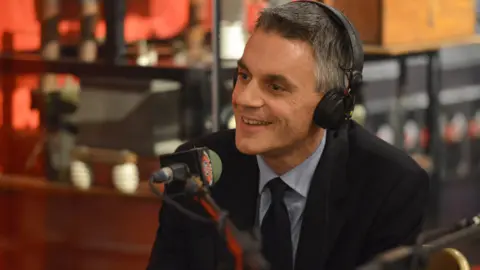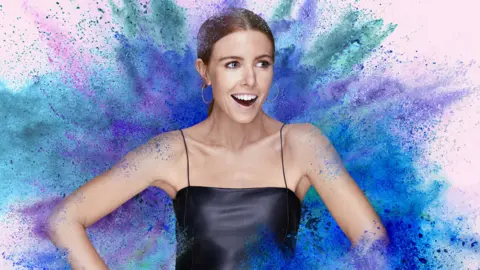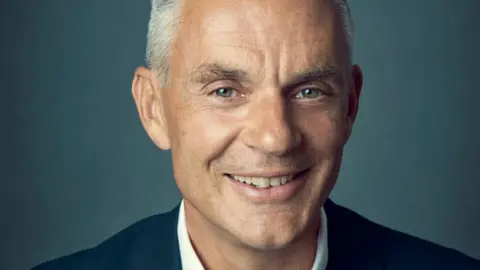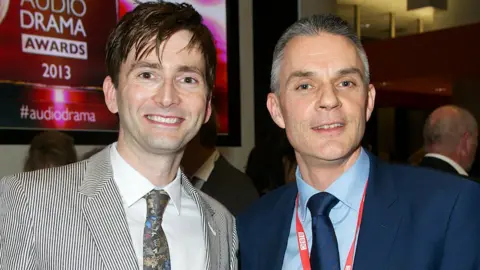Tim Davie: BBC executive named director general
 BBC
BBCTim Davie, one of the BBC's most senior executives, has been named the broadcaster's new director general.
Davie has been promoted from chief executive of BBC Studios, the commercial subsidiary that makes programmes and also sells them abroad.
He became acting director general after the resignation of George Entwistle in 2012, and will now replace Tony Hall.
His top priorities will include negotiating with the government about the future of the licence fee.
The TV licence system will stay in place until at least 2027, but the government is due to review the funding level from 2022 onwards.
In a statement, Davie said he was "honoured" to get the BBC's top job.
'We need to accelerate change'
"This has been a critical time for the UK and these past few months have shown just how much the BBC matters to people," he said.
"Our mission has never been more relevant, important or necessary. I have a deep commitment to content of the highest quality and impartiality.
"Looking forward, we will need to accelerate change so that we serve all our audiences in this fast-moving world.
"Much great work has been done, but we will continue to reform, make clear choices and stay relevant. I am very confident we can do this because of the amazing teams of people that work at the BBC."

Lord Hall described Davie as "a fantastic leader", adding: "I wish him every success for the future. I know that the BBC is in safe hands."
Davie will be paid £525,000 a year - £75,000 more than Lord Hall, but £75,000 less than he was getting as head of BBC Studios.
The BBC said the director general's salary had not increased since 2012, and this is the level that it would have reached had inflation been applied. It added Davie has "agreed to take a salary stand-still" and be paid £450,000 until August 2021, as "all senior managers at the BBC are currently on a salary freeze".
One of Davie's other pressing tasks will be to help work out how to make the £125m savings Lord Hall has said the BBC needs to find this year.

BBC chairman Sir David Clementi said "the organisation faces significant challenges as well as opportunities".
He added: "I am confident that Tim is the right person to lead the BBC as it continues to reform and change."
At BBC Studios, Davie has overseen the production of programmes like Blue Planet II, Doctor Who, Strictly Come Dancing and EastEnders for the BBC, as well as the sale of shows to more than 200 countries.
Its revenues of £243m were ploughed back into the BBC in 2018/19.
That commercial experience is likely to be called upon when he starts his new post in September. For example, Lord Hall recently raised the idea of turning BBC Four into a global subscription channel.
The question of whether to bring back BBC Three as a regular TV channel is also up in the air.


Tim Davie has landed one of the most privileged jobs in Britain and the global media, leading thousands of creative people at a remarkable moment in history.
Aside from that, it's hell.
The challenges are enormous - and those are just the ones we already know about. Tony Hall had the toughest job of any director general in BBC history. Davie will have an even tougher time.
Those challenges include, in no particular order:
- A political negotiation over the future licence fee with a government that recently made several threats to the corporation
- A re-evaluation of the commercial model of the BBC, so that it can compete in a hyper-inflationary modern media landscape
- The irreversible flight of younger audiences to other platforms
- Maintaining outstanding programming, trust among a global audience, and standards of impartiality at a time when social media makes that infinitely harder
- Creating a BBC that truly represents Britain
And that's just the inbox. Most DGs' legacies are defined by how they handle unforeseen crises, like famous presenters making prank calls, or the revelation that many women are being paid less than men for doing the same work, which is illegal.
It is, obviously, an extraordinary opportunity, which has the considerable consolation that whatever comes after will be easier (and probably better paid).
The BBC has many critics, but most people will wish Davie luck. He will need it.

What's the reaction to the appointment?
Culture Secretary Oliver Dowden welcomed Davie's appointment and his "commitment to impartiality at the BBC, as well as the need for further reform".
Allow X content?

Former Chancellor George Osborne, who now edits the Evening Standard newspaper, said Davie is "steeped in the tradition of the corporation but with the commercial experience it absolutely needs".
But BBC journalist Carrie Gracie, who led an equal pay battle with the corporation two years ago, said it was "a shame we couldn't have a great woman".
She added: "But at least he's sat down with staff angry on gender, race and other challenges. Looked as if he was listening. Let's see what he does."
Food writer and broadcaster Jack Monroe noted that Davie was "continuing the 100-year old tradition of the BBC director general role being held by a man" - and that he went to Cambridge.
Former Panorama and Newsnight reporter John Sweeney described Davie as "pin-sharp, brave, decent, good", adding: "The BBC is safe,", while Radio 2 host Jeremy Vine said the appointment was "absolutely fantastic news".

Who is Tim Davie?

Davie is one of the corporation's longest-serving executives, joining from Pepsi to become director of the BBC's Marketing, Communications & Audiences division in 2005.
He then took over responsibility for radio stations including Radios 1, 2, 3 and 4 as director of the Audio & Music division in 2008.
Soon afterwards, he had to address the outcry caused by prank calls made by Russell Brand and Jonathan Ross on Radio 2. The decision to shut 6 Music under his tenure, which was later reversed, also brought scrutiny.
A month after being named chief executive of the corporation's commercial arm BBC Worldwide in 2012, he stepped in to become acting director general after Entwistle's short-lived tenure.
Entwistle had resigned after just eight weeks at the helm following a Newsnight error in a child abuse report.

Davie returned to BBC Worldwide after Lord Hall's appointment as Entwistle's permanent successor, and Davie oversaw the merger of BBC Worldwide with the BBC's production arm to form BBC Studios in 2018.
Last year, Davie turned down an offer to become head of the Premier League. He was also chair of Comic Relief, a role he has just relinquished.
He is now to become the 17th director general in the corporation's 98-year history.

Follow us on Facebook, or on Twitter @BBCNewsEnts. If you have a story suggestion email [email protected].
